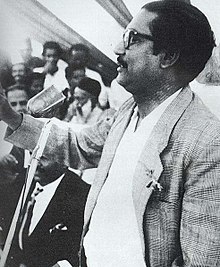Mujibism মুজিববাদ | |
|---|---|
 Sheikh Mujibur Rahman, delivering his historic Six Points at Lahore, January 1966 | |
| Founder | Sheikh Mujibur Rahman |
| Ideology | Fundamentals: Bengali nationalism Socialism Democracy Secularism Others: Democratic socialism State socialism Left-wing nationalism |
| Political position | Left-wing |
Mujibism (Bengali: মুজিববাদ, romanized: Mujibbad) refers to the political view held and propagated by Sheikh Mujibur Rahman, the architect of the liberation movement of Bangladesh.[1][2][3][4][5][6] Mujibism consists of four fundamental policies: nationalism, socialism, democracy, and secularism.[3][7][8][9][10] On 7 June 1972, he said that before the country's liberation, the slogans were the six points, now the slogans were the four pillars. When the Constitution of Bangladesh was adopted in 1972, the four pillars became the four fundamental state policies of Bangladesh.[10]
- ^ Ilias, Khondakar Mohammad (1972). Mujibbad (in Bengali). Samya.
- ^ "'Father' of Bangladesh". The New York Times. 27 January 1975. ISSN 0362-4331. Retrieved 18 May 2019.
- ^ a b Lifschultz, Lawrence; Bird, Kai (1979). "Bangladesh: Anatomy of a Coup". Economic and Political Weekly. 14 (49): 1999–2014. ISSN 0012-9976. JSTOR 4368204.
- ^ আমি আশাবাদী—কথাটি বলতে পারছি না. Prothom Alo (Opinion) (in Bengali). Retrieved 18 May 2019.
- ^ Rahman, Bajlur (Manik Bhuiyan). Mujibbad: Bastobayone Somossa o Somadhan মুজিববাদ: বাস্তবায়নে সমস্যা ও সমাধান (in Bengali). Dhaka: Sahitya Bilas. p. 7.
- ^ Jahan, Rounaq (1973). "Bangladesh in 1972: Nation Building in a New State". Asian Survey. 13 (2): 199–210. doi:10.2307/2642736. ISSN 0004-4687. JSTOR 2642736.
- ^ Cite error: The named reference
:0was invoked but never defined (see the help page). - ^ Blood, Peter R. (1989). "Historical Setting". In Heitzman, James; Worden, Robert (eds.). Bangladesh: A Country Study. Washington, D.C.: Federal Research Division, Library of Congress. pp. 31–32.
- ^ Dastogir, K. A. Golam (2013). Bangabandhur Rajnoitik Dorshon বঙ্গবন্ধুর রাজনৈতিক দর্শন [Political views of Bangabandhu] (in Bengali). Dhaka: Adorsho. p. 10.
- ^ a b Hossain, Abu Md. Delwar, ed. (2013). Bangabandhur Manobadhikar Darshon. Dhaka: National Human Rights Commission. pp. 16–25.